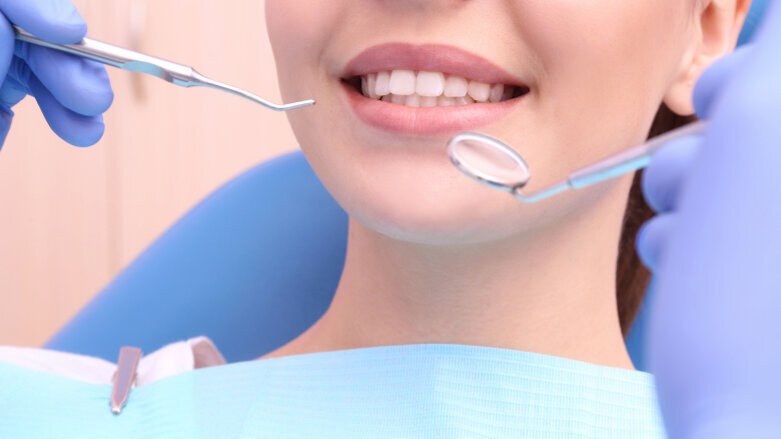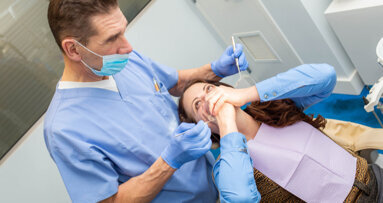ATLANTA, U.S.: Poor oral health and hygiene are known risk factors for oral squamous cell carcinoma (OSCC). Researchers have now found that poor oral health behaviors, such as infrequent dental visits and dental flossing, are associated with increased risk of HPV-negative but not with HPV-positive OSCC.
The study included patients with newly diagnosed OSCC at the Ohio State University Comprehensive Cancer Center between 2011 and 2014, 117 of which had HPV-positive cancers and 114 HPV-negative. Controls were patients without cancer from the same outpatient clinic who were matched to each case.
An analysis of oral health behaviors of each group showed that visiting a dental clinic less than once a year and brushing their teeth less than once per day significantly increased risk of HPV-negative OSCC. In addition, gingival bleeding, tooth loss and denture use significantly increased risk of HPV-negative OSCC. None of these increased risk of HPV-positive OSCC. The findings are consistent with the researchers’ hypothesis that poor oral health behaviors alter oral microbial composition to promote chronic inflammation and the development of HPV-negative OSCC.
Factors such as low education level, low income level, heavy smoking and excessive consumption of alcohol were associated with increased risk of HPV-negative OSCC. The factors associated with increased risk of HPV-positive OSCC were low education level, a high rate of marijuana use and a high number of oral sex partners.
The study was presented at the American Association for Cancer Research Annual Meeting 2019 in Atlanta on March 29—April 3.
Tags:
HELSINKI, Finland: Human papillomavirus (HPV) causes roughly 2% of oral cavity or laryngeal cancers and 31% of oropharyngeal cancers, according to a Lancet ...
MURADNAGAR, India: Many people with dental anxiety avoid regular visits to the dentist, which in turn can lead to a deterioration in their oral health and ...
HELSINKI, Finland: Scientists have previously identified obesity and increasing age as risk factors for gestational diabetes mellitus (GDM). Some scholars ...
SYDNEY, Australia: The underlying causes of central sensitisation disorders such as migraine and fibromyalgia are poorly understood. The gut–brain axis ...
LONDON, UK: Though elite athletes generally possess an enviable level of physical fitness, a recent study has shown that their oral health may leave much to...
ORADEA, Romania: Ongoing research continues to illuminate the plethora of ways in which oral and systemic health influence each other. While odontogenic ...
LONDON, UK: As dentistry becomes more technologically advanced, the importance of having an informed patient continues to grow. With this in mind, a new ...
SAN FRANCISCO, U.S.: Smoking remains a leading cause of oral cancer, and the tobacco product range is evolving with increasing use of non-cigarette tobacco ...
BOSTON, U.S.: It has been well established that early detection of oral cancer is key for successful treatment and an optimal outcome. In a concerning piece...
TAIPEI, Taiwan: The debate on climate change and its effects on the earth are a hot topic. One discussion, in particular, is around air pollution, which is ...
Live webinar
Tue. 24 February 2026
1:00 pm EST (New York)
Prof. Dr. Markus B. Hürzeler
Live webinar
Tue. 24 February 2026
3:00 pm EST (New York)
Prof. Dr. Marcel A. Wainwright DDS, PhD
Live webinar
Wed. 25 February 2026
11:00 am EST (New York)
Prof. Dr. Daniel Edelhoff
Live webinar
Wed. 25 February 2026
1:00 pm EST (New York)
Live webinar
Wed. 25 February 2026
8:00 pm EST (New York)
Live webinar
Tue. 3 March 2026
11:00 am EST (New York)
Dr. Omar Lugo Cirujano Maxilofacial
Live webinar
Tue. 3 March 2026
8:00 pm EST (New York)
Dr. Vasiliki Maseli DDS, MS, EdM



 Austria / Österreich
Austria / Österreich
 Bosnia and Herzegovina / Босна и Херцеговина
Bosnia and Herzegovina / Босна и Херцеговина
 Bulgaria / България
Bulgaria / България
 Croatia / Hrvatska
Croatia / Hrvatska
 Czech Republic & Slovakia / Česká republika & Slovensko
Czech Republic & Slovakia / Česká republika & Slovensko
 France / France
France / France
 Germany / Deutschland
Germany / Deutschland
 Greece / ΕΛΛΑΔΑ
Greece / ΕΛΛΑΔΑ
 Hungary / Hungary
Hungary / Hungary
 Italy / Italia
Italy / Italia
 Netherlands / Nederland
Netherlands / Nederland
 Nordic / Nordic
Nordic / Nordic
 Poland / Polska
Poland / Polska
 Portugal / Portugal
Portugal / Portugal
 Romania & Moldova / România & Moldova
Romania & Moldova / România & Moldova
 Slovenia / Slovenija
Slovenia / Slovenija
 Serbia & Montenegro / Србија и Црна Гора
Serbia & Montenegro / Србија и Црна Гора
 Spain / España
Spain / España
 Switzerland / Schweiz
Switzerland / Schweiz
 Turkey / Türkiye
Turkey / Türkiye
 UK & Ireland / UK & Ireland
UK & Ireland / UK & Ireland
 Brazil / Brasil
Brazil / Brasil
 Canada / Canada
Canada / Canada
 Latin America / Latinoamérica
Latin America / Latinoamérica
 USA / USA
USA / USA
 China / 中国
China / 中国
 India / भारत गणराज्य
India / भारत गणराज्य
 Pakistan / Pākistān
Pakistan / Pākistān
 Vietnam / Việt Nam
Vietnam / Việt Nam
 ASEAN / ASEAN
ASEAN / ASEAN
 Israel / מְדִינַת יִשְׂרָאֵל
Israel / מְדִינַת יִשְׂרָאֵל
 Algeria, Morocco & Tunisia / الجزائر والمغرب وتونس
Algeria, Morocco & Tunisia / الجزائر والمغرب وتونس
 Middle East / Middle East
Middle East / Middle East












































To post a reply please login or register